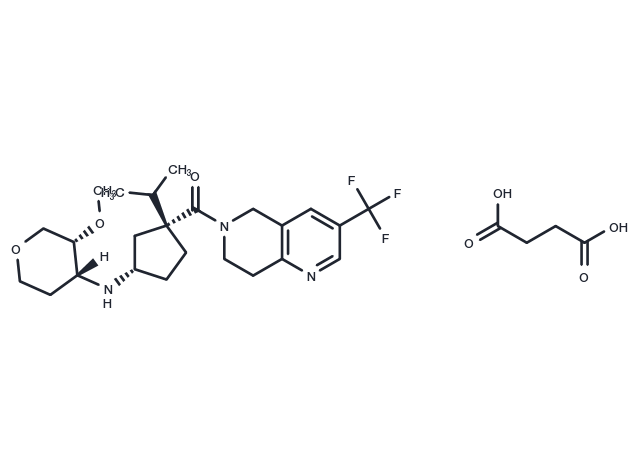Powder: -20°C for 3 years | In solvent: -80°C for 1 year


MK-0812 Succinate is an effective and selective CCR2 antagonist.

| Pack Size | Availability | Price/USD | Quantity |
|---|---|---|---|
| 1 mg | In stock | $ 59.00 | |
| 2 mg | In stock | $ 85.00 | |
| 5 mg | In stock | $ 147.00 | |
| 10 mg | In stock | $ 277.00 | |
| 25 mg | In stock | $ 562.00 | |
| 50 mg | In stock | Inquiry | |
| 1 mL * 10 mM (in DMSO) | In stock | $ 189.00 |

| Description | MK-0812 Succinate is an effective and selective CCR2 antagonist. |
| Targets&IC50 | MCP-1:4.5 nM |
| In vitro | MK-0812 not only fully blocks the shape change response to exogenous MCP-1 but also causes a monocyte forward scatter measurement below unstimulated or basal levels. The addition of MK-0812 to rhesus blood also inhibits MCP-1 induced monocyte shape change. The IC50 for MK-0812 in whole blood assays is 8 nM. MK-0812 fully blocks all MCP-1 mediated response in a concentration-dependent manner (IC50: 3.2 nM). This value is similar to the potency observed for the inhibition of 125I-MCP-1 binding by MK-0812 on isolated monocytes (IC50: 4.5 nM) [2]. |
| In vivo | MK-0812 is administered by continuous i.v. infusion to maintain a constant level of the drug in the blood. MK-0812 treatment induces a dose-dependent reduction in circulating Ly6Chi monocytes and a corresponding elevation in the CCR2 ligand CCL2. MK-0812 (30 mg/kg, p.o.) decreases the frequency of Ly6G-Ly6Chi monocytes in the peripheral blood, while no impact on circulating Ly6G+Ly6C+ neutrophil frequency is observed [1][2]. |
| Molecular Weight | 587.63 |
| Formula | C28H40F3N3O7 |
| CAS No. | 851916-42-2 |
Powder: -20°C for 3 years | In solvent: -80°C for 1 year
DMSO: 28 mg/mL (47.65 mM)
You can also refer to dose conversion for different animals. More
bottom
Please see Inhibitor Handling Instructions for more frequently ask questions. Topics include: how to prepare stock solutions, how to store products, and cautions on cell-based assays & animal experiments, etc.
MK-0812 Succinate 851916-42-2 Immunology/Inflammation Microbiology/Virology Others CCR CC chemokine receptor MK 0812 Inhibitor MK0812 Succinate MK 0812 Succinate MK0812 MK-0812 inhibit inhibitor
